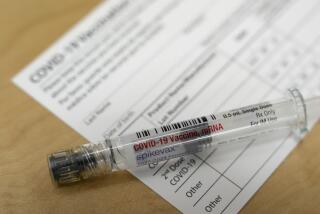Reviving Smallpox Vaccinations Is Opposed
SAN FRANCISCO — Public health experts argued at a forum Thursday that a return to mass smallpox vaccinations is ill-advised unless there is an outbreak of the disease or a confirmed bioterrorism attack using the virus.
A group of epidemiologists charged with helping the federal government update its vaccination policies said the vaccine carries so many risks it should be used with restraint.
The comments came at one of four forums the federal Centers for Disease Control and Prevention is holding across the country to gain recommendations from health officials and the public about possible changes in vaccine policy.
Although smallpox was eradicated worldwide in 1977, last year’s anthrax attacks have renewed concern about the virus’ use in bioterrorism. Officials are worried that vials of the virus kept in storage in the former Soviet Union may have fallen into the hands of Iraq or North Korea, although no evidence of this has emerged.
Current recommendations call for vaccinating only lab workers and scientists who work with viruses related to smallpox. Changes under consideration include making the vaccine available to health care and emergency workers who would be first to respond if there were an outbreak, and extending vaccinations on a voluntary basis to the public.
The U.S. Department of Health and Human Services expects to stockpile 286 million doses, enough to protect each resident, by early 2003. The Advisory Committee on Immunization Practices and the National Vaccine Advisory Committee have been asked to provide an updated set of smallpox vaccine recommendations to the federal government by June 20.
One concern among health officials is that the risks of vaccination are greater than before. If routine vaccines were reintroduced now, the number of resulting deaths could be as high as 5 for every million adults inoculated--five times the risk in the 1960s.
That is because there are millions more people in the United States with immune deficiencies than there were at the time mass vaccinations were discontinued.
Because the vaccine contains a live virus and creates a temporary lesion on the skin where it is administered, people who receive the vaccine are potentially able to transmit smallpox symptoms to other parts of their own bodies and to other people for about 10 days after receiving the vaccine.
If the symptoms are passed on to people with immune deficiencies, including those who are infected with the human immunodeficiency virus and patients who have undergone chemotherapy or organ transplants, that threat is particularly grave, health experts said.
“There’s just no way to guide us in terms of any previous experience. Those are the dilemmas,” said Dr. Hal Margolis, senior advisor to the director for Smallpox Planning and Response at the U.S. Centers for Disease Control.
About 11,000 lab workers and scientists have been vaccinated in the U.S. since 1983.
The nation stopped vaccinating children for the disease in 1972 because the likelihood of complications, even death, from the vaccine was considered a greater threat than the disease.
For now, the primary strategy for containing smallpox is to isolate those infected and selectively vaccinate those around them, forming a protective “ring.”
The vaccine is considered effective in preventing and reducing the severity of the disease, even if it is administered shortly after a person is exposed to smallpox.
“If we have the infrastructure in place, then we can measure the risks” for each individual before administering the vaccine, said Dr. Ann Margaret Arvin, a member of the immunization practices advisory committee and professor of pediatrics and infectious disease at Stanford University Medical School. “By and large, what I’ve heard today is that people want to take a measured approach.”
Were it not for the potential of terrorist attack--which officials consider low--the risks of the vaccine would continue to outweigh its benefits, experts said.
More to Read
Sign up for Essential California
The most important California stories and recommendations in your inbox every morning.
You may occasionally receive promotional content from the Los Angeles Times.










